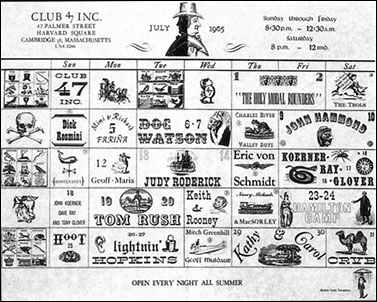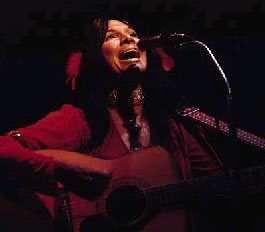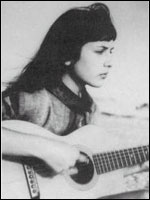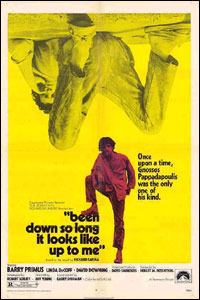|
Club 47 and the Early
Cambridge Folk Scene |
|
In the mid-fifties, the Club 47, in Cambridge’s Harvard Square,
was an oasis of progressive jazz as the first stirrings of the social
turmoil that swept the nation during the sixties began to surface in
the Deep South. On December 1, 1955, in Montgomery, Alabama, Ms. Rosa
Parks refused to move to the back of the bus and Three years later, a young Boston University student named Joan Baez talked her way onto the Club 47 stage where she puzzled the jazz crowd with a medley of Childe Ballads and Carter Family licks. The Club’s management liked the novelty but balked at her request to come back and play the next Sunday. They gave in, she packed the house with her friends, the show turned a profit, and the result was a regular Sunday afternoon gig to which she invited her sister, Mimi, her folk singing friends in and around Harvard Square and a Harvard grad by the name of Pete Seeger, son of a well-to-do family turned union organizing minstrel in the tradition of Joe Hill and the Wobblies. Thus was born the Cambridge folk revival, precursor of the nation’s folk revival that, a decade later, in Haight Ashbury, merged with the cultural underground in time for the Beatles’ release, in the summer of 1967, of Sergeant Pepper’s Lonely Hearts Club Band.
Mimi died last year, having, for many years, supported a number of
socially progressive causes. Tributes to her generosity poured in Mimi’s first husband, Richard Farina, was killed in a motorcylce
accident on the night that his novel, "Been Down So Long It Looks
Like Up To Me" hit the bookstands. Two of the three grandparents of the modern folk revival have New England connections: Peter Yarrow in Maine and Mary Travers in Connecticut. Though Paul Stookey hails from the Midwest, rumor has it that he’s currently at Northfield Mt. Hermon where his wife is serving as chaplain to students and faculty. Some years ago, a young man whose family summered in Franklin County looked up at the Savoy hills and down at the Shelburne Falls potholes and exclaimed, "Here is a land full of power and glory!" He turned that line into the refrain that became the theme song of his tragically short life. Phil Ochs was the first of that generation of folkies to leave this life, but he put a defining stamp on that turbulent era, inspired, in no small part, by the charm and grandeur of the Valley. |
|
Photo Credits |
 formally initiated
the modern Civil Rights movement with her shot heard ‘round the
world.
formally initiated
the modern Civil Rights movement with her shot heard ‘round the
world. Historians will likely see in that revival an expression of the
civil rights, anti-war, acid-tripping rebellion of the switched-on,
dropped out segment of the Baby Boomer generation. As a teenage
participant in that revival, washing dishes and bussing tables at the
Club 47, earning a dollar an hour, no small change for a high school
kid in those days, I recall a grand, exciting time filled with sparkle
and promise. Three of the Club 47’s regulars had Valley connections:
Taj Mahal from Springfield, Buffy Ste. Marie from Lynnfield who’d
gone to UMass and Lisa Kindred with family in Greenfield. Two Amherst
College grads, Bill Keith, a banjo player and inventor of the open
tuning peg, and Jimmy Rooney, a lefthanded flatpicker, took over the
Club 47 until its demise and rebirth, as the Passim Coffeehouse on
Palmer Street in back of the Harvard Coop. Two of my college friends,
Bill Knowlin and Ken Erwin, started and, more than thirty years later,
continue to produce Rounder Records. Bill and Ken have done yeoman
service to the folk community by making available, at affordable
prices, the work of many artists that we might not otherwise have had
the joy of seeing and hearing.
Historians will likely see in that revival an expression of the
civil rights, anti-war, acid-tripping rebellion of the switched-on,
dropped out segment of the Baby Boomer generation. As a teenage
participant in that revival, washing dishes and bussing tables at the
Club 47, earning a dollar an hour, no small change for a high school
kid in those days, I recall a grand, exciting time filled with sparkle
and promise. Three of the Club 47’s regulars had Valley connections:
Taj Mahal from Springfield, Buffy Ste. Marie from Lynnfield who’d
gone to UMass and Lisa Kindred with family in Greenfield. Two Amherst
College grads, Bill Keith, a banjo player and inventor of the open
tuning peg, and Jimmy Rooney, a lefthanded flatpicker, took over the
Club 47 until its demise and rebirth, as the Passim Coffeehouse on
Palmer Street in back of the Harvard Coop. Two of my college friends,
Bill Knowlin and Ken Erwin, started and, more than thirty years later,
continue to produce Rounder Records. Bill and Ken have done yeoman
service to the folk community by making available, at affordable
prices, the work of many artists that we might not otherwise have had
the joy of seeing and hearing. to
her website,
to
her website,  His driving dulcimer
("Hi, ho, hey, I am the bold marauder…") and brash
personality captured the spirit of those tumultuous times; sensitive
and saucy, graceful and gritty. Arguably America’s greatest
late-twentieth century novelist, Thomas Pynchon, dedicated arguably
his greatest novel, "Gravity’s Rainbow" to Richard Farina,
a fellow Cornell alum. Though raised in Oyster Bay, Long Island, the
illusive Thomas Pynchon has roots in the Valley, being descended from
the Pynchon family that founded the city of Springfield
His driving dulcimer
("Hi, ho, hey, I am the bold marauder…") and brash
personality captured the spirit of those tumultuous times; sensitive
and saucy, graceful and gritty. Arguably America’s greatest
late-twentieth century novelist, Thomas Pynchon, dedicated arguably
his greatest novel, "Gravity’s Rainbow" to Richard Farina,
a fellow Cornell alum. Though raised in Oyster Bay, Long Island, the
illusive Thomas Pynchon has roots in the Valley, being descended from
the Pynchon family that founded the city of Springfield